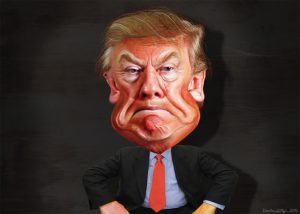 Among Donald Trump’s many provocative statements, his recent claims that a specific federal judge with a “Mexican heritage” and Muslim judges in general would be biased against him have apparently struck a special chord. Even Trump’s fellow Republicans have been highly critical. Senator Mitch McConnell of Kentucky, for example, completed disavowed Trump’s claims, noting “All of us come here from somewhere else.”
Among Donald Trump’s many provocative statements, his recent claims that a specific federal judge with a “Mexican heritage” and Muslim judges in general would be biased against him have apparently struck a special chord. Even Trump’s fellow Republicans have been highly critical. Senator Mitch McConnell of Kentucky, for example, completed disavowed Trump’s claims, noting “All of us come here from somewhere else.”
Most of the criticisms deplore Trump’s lack of respect for American diversity and also his racism. House Speaker Paul Ryan said in this regard that Trump’s comments amounted to “textbook racism.” However, I wonder if some part of the strong negative reaction also relates to Trump’s challenge to an American belief in law and in the courts’ ability to apply law in a fair and objective manner.
I have argued in several of my writings that a belief in law should be recognized as an important tenet of American ideology, with “ideology” being understood as a normative expression of dominant beliefs rather than as a manipulative falsehood. Americans have traditionally believed in law, which is presumably understandable, made in public, and useful for one and all. In addition, law is supposed to be applied without bias, and independent courts in particular are expected to adjudicate disputes fairly and to decide similar cases in similar ways. “Ideologues” — that is, believers in and promoters of this ideology– routinely assure us that Americans live by the rule of law more so than any other nation.
Trump’s comments about the judiciary problematize the notion of independent courts ruling fairly and without bias, and political leaders and government officials – those most likely to champion the belief in law – have taken the greatest umbrage. In his criticism of Trump, Senator Lindsey Graham, Republican from South Carolina, referenced still another figure who disrespected the belief in law. Graham deplored Trump’s claims, saying they were “the most un-American thing from a politician since Joe McCarthy.”
Caricature by DonkeyHotey

It was entertaining to watch Mr. Trump try to explain his comments by making two major points:
1) that he’s not racist because even Hispanics (“Mexicans”) and Muslims in America like his ideas and will benefit from them and,
2) the judge is Hispanic (“Mexican”) and they all hate him. Muslims too.
Better Mr. Trump should say nothing.
sean s.
Trump has continually expressed beliefs that are in direct opposition to the Constitution of the US and mocked the laws that a president vows to protect, preserve and defend. If Trump won the election, I believe he could not “assume the Presidency” since he could not take the “Oath of office” (Article II, Section 1, clause 8) “I do solemnly swear (or affirm) that I will faithfully execute the Office of President of the United States, and will to the best of my ability, preserve, protect and defend the Constitution of the United States,” without committing perjury. Perjury is defined as: “the voluntary violation of an oath or vow either by swearing to what is untrue or by omission to do what has been promised under oath.” The framers of the Constitution saw it important to include the specific wording of the “Oath of Office” while leaving out details how and when it was administered. Maybe they had in mind a “worst-case scenario” where its wording would be of great importance to “We the People.”
In this instance I don’t believe Mr. Trump was acting in a racist manner (although he certainly has in the past), he was merely expressing a concern that his earlier comments may lead to bias based on the judges’ backgrounds.
I see this as more insulting of the judges’ ethics and character as he was questioning their ability to act impartially.